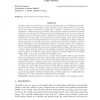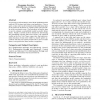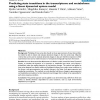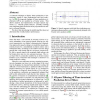221 search results - page 19 / 45 » Time Series Prediction by Perturbed Fuzzy Model |
142
click to vote
JMLR
2011
14 years 6 months ago
2011
A widely agreed upon definition of time series causality inference, established in the seminal 1969 article of Clive Granger (1969), is based on the relative ability of the histor...
CIKM
2011
Springer
13 years 11 months ago
2011
Springer
We present a hybrid method to turn off-the-shelf information retrieval (IR) systems into future event predictors. Given a query, a time series model is trained on the publication...
BMCBI
2007
14 years 11 months ago
2007
Background: Modelling of time series data should not be an approximation of input data profiles, but rather be able to detect and evaluate dynamical changes in the time series dat...
102
click to vote
ICASSP
2008
IEEE
15 years 5 months ago
2008
IEEE
A common technique to deploy linear prediction to nonstationary signals is time segmentation and local analysis. In [1], the temporal changes of linear prediction coefficients (L...
131
click to vote
TFS
2008
14 years 10 months ago
2008
Abstract--This study proposes an efficient self-evolving evolutionary learning algorithm (SEELA) for neurofuzzy inference systems (NFISs). The major feature of the proposed SEELA i...




